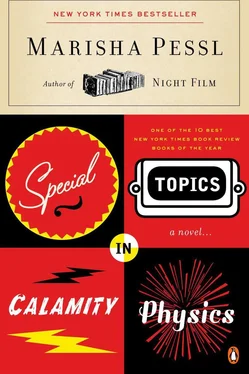“I think we should go,” Nigel announced that Friday at Jade’s.
“Me too,” said Leulah.
“You can’t,” Charles said. “She didn’t invite you.”
“A minor detail,” Nigel said.
In spite of Charles’ words of warning, the following Sunday, halfway through dinner, Nigel removed the invitation from his back pocket and brazenly placed it next to the platter of veal chops, without saying a word.
In that instant, the dining room became nail-bitingly unbearable (see Midday Face-Off at Sioux Falls: A Mohave Dan Western , Lone Star Publishers, Bendley, 1992). Dinners had already become a teensy bit unbearable since I’d gone to Cottonwood. I found it impossible to look at Hannah’s face, to smile gaily, to shoot the breeze about schoolwork or term papers or Mr. Moats’ penchant for textured shirts without envisioning Doc and his accordion legs, his wrinkled face like wood once infested with termites, not to mention the horror of their Hollywood Kiss, which, granted, had taken place offscreen, but was still scary. (It was two different movies crudely edited together— Gilda with Cocoon. )
Of course, when I considered Jade, Lu, and the handicapped stall, I also felt queasy; but with Hannah it was worse. As Dad said, the difference between a dynamic and a wasted uprising depends upon the point at which it occurs within a country’s historic timeline (see Van Meer, “The Fantasy of Industrialization,” Federal Forum , Vol. 23, Issue 9). Jade and Lu were still developing nations. And thus, while it wasn’t fantastic, it also wasn’t too terrible for them to have a backward infrastructure and a poor human development index. But Hannah — she was much further along. She should have already established a robust economy, peacefulness, free trade — and as these things weren’t yet assured, frankly, it wasn’t looking good for her democracy. She could very well struggle forever, with “corruption and scandal perpetually undermining [her] credibility as a self-ruled state.”
Milton had opened a window. A puppyish draft tore around the dining room, causing my paper napkin to fly off my lap, the flames to dance violently atop the candles like lunatic ballerinas. I couldn’t believe what Nigel had done, acted like a jealous husband presenting his wife with an incriminating cufflink.
And yet, Hannah gave no reaction.
She didn’t even seem to notice the invitation, concentrating instead on her veal chop, cutting it into identically sized pieces with an elegant handbag of a smile on her face. Her blouse, satin and sea-green (one of her few articles of clothing that didn’t carry itself like a refugee), clung to her as a languid, iridescent skin, moving when she moved, breathing when she breathed.
This uneasiness continued for what felt like an hour. I toyed with the idea of stretching my arms over my veal chop in the direction of the sautéed spinach, grabbing the thing, stealthily slipping it under my leg, but, to be honest, I didn’t have the moral aplomb to perform such things as The Sir Thomas More or The Jeanne d’Arc. Nigel was sitting in his chair staring at Hannah, and the way his eyes were buried behind his glasses, reflecting the candles, until he turned his head and they emerged for a moment like beetles in sand, the way he sat so straight, so small yet so substantial, he looked like Napoleon, especially the unappealing oil rendering of the diminutive French Emperor on the cover of Dad’s foundational seminar textbook, Mastering Mankind (Howards & Path, 1994). (He looked as if he could perform a coup d’état in his sleep and had no qualms being at war with every major European power.)
“I didn’t tell you,” Hannah said suddenly, “because if I did, you’d want to come. And you can’t. I’m inviting Eva Brewster, which makes your attendance out of the question if I’m to keep my job.”
Not only was her reaction surprising (also a bit of a letdown; I suppose I was in the stands, drinking Anis del Toro, awaiting the matador), but also remarkable and slick was the way she’d seen the invitation but appeared not to have seen it.
“Why’d you invite Eva Brewster?” asked Leulah.
“She heard I was planning the fund-raiser and asked if she could come. I couldn’t say no. Nigel, I don’t appreciate your going through my things. Please give me the courtesy of privacy.”
No one said anything. It was Nigel’s cue to explain himself, to give some semblance of an apology, attempt some flea-bitten joke about his sticky fingers or refer to Cool Parenting ’s Chapter 21, “Teenagers and the Joy of Kleptomania,” quoting one of the surprising statistics, that it was common for teenagers to go through a period of “appropriation” and “embezzlement” (Mill, 2000). Sixty percent of the time it was something “the youngster eventually grew out of, like Gothic eye makeup and skateboarding” (p. 183).
But Nigel wasn’t paying attention. He was cheerfully helping himself to the last veal chop.
Soon the food was cold. We cleared the plates, collected our books, said weak good-byes into the monstrous night. Hannah leaned against the doorway, saying what she always did—“Drive home safely!”—but something in the timbre of her voice, that certain campfire quality, was gone. As Jade and I drove down the driveway, I looked back and saw her still standing on the porch, watching us, her green blouse in the gold light shivering like a swimming pool.
“I feel sick,” I said.
Jade nodded. “Utterly wretched.”
“Wonder if she’ll forgive him.”
“Of course she will. She knows him like the back of her hand. Nigel was born without the feeling gene. Other people have no appendix, not enough white blood cells. He doesn’t have enough feeling. I guess they did a scan of his brain when he was kid and where other people have emotion, he has a vacuum of total space, poor kid. And he’s gay, too. And sure, everyone’s openminded and accepting — all that jazz — but it still can’t be easy in high school.”
“He’s gay?” I asked in amazement.
“Earth to Retch? Hel lo? ” She looked at me as if I were a snag in tights. “You know, sometimes I wonder if you’re all there, if you know what I mean. Have you ever gone to a doctor to make sure you have all your furniture upstairs? Because I have serious doubts about it, Gag. I really do.”
Such things as anguish, woe, affliction, guilt, feelings of awfulness and utter wretchedness, the bread and butter of Days of Yore and Russians, sadly have very little staying power in these lickety-split Modern Times.
One has only to consult the 2002 edition of R. Stanbury’s Illuminating Statistics and Cross-Century Comparisons , under “Grieving,” to learn that the very idea of being Brokenhearted, Wretched, Desolate and Despairing is a thing of the past, soon to take on the amusing novelty of such archaic things as the Jalopy, the Jitterbug and Jams. The average American widower in 1802 waited an average of 18.9 years before remarrying, while in 2001 he holds out for an average 8.24 months. (In the “By State” snapshot, you will see in California he holds out for a horrifying 3.6 months.)
Of course, Dad made it his business to rage against this “cultural anesthetizing,” this “ironing out of deep human sentiment, leaving only a flat, unwrinkled vacuity,” and thus he’d deliberately raised me to be an insightful, sensitive sort of person, someone aware, beneath even the most tedious surfaces, of good, evil and the smoky shades in between. He made sure I took the time between Muders, Ohio, and Paducah, Washington, to commit to memory not one or two, but all of Blake’s “Songs of Innocence and Experience,” and thus I couldn’t look at a fly buzzing around a hamburger without fretting, “Am not I / A fly like thee? / Or art not thou / A man like me?”
Читать дальше












